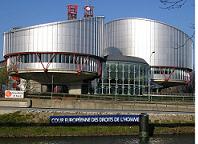European Court
The Dickensian world of extradition
 The coalition government is now facing an important test of its civil liberties' commitments, as the European court of human rights today, after three years, again temporarily froze four men's extradition to the United States to face terrorism charges.
The coalition government is now facing an important test of its civil liberties' commitments, as the European court of human rights today, after three years, again temporarily froze four men's extradition to the United States to face terrorism charges.
Three of the men are British citizens – Babar Ahmad and Seyla Talha Ahsan, held at Long Lartin prison, Haroon Rashid Aswat, held in Broadmoor secure mental hospital – and the fourth man is Mustafa Kamel Mustafa, known as the radical cleric Abu Hamza and originally an Egyptian citizen.
The key case is that of Babar Ahmad, who last year was paid substantial damages of £60,000 by the Metropolitan police for assault during his first arrest and the search of his house in December 2003. He was not charged in the UK. But the evidence used in his extradition case was taken by the police and given to the US. Seven years later a big question mark must hang over the credibility of that evidence, after last year's high court case, when Ahmad sued the police, revealed an extraordinary pattern of lost key police documents.
The Crown Prosecution Service is currently considering whether to prosecute members of the Metropolitan police. Ahmad sustained more than 70 serious injuries in 2003, and claims he is still affected to this day from the acute trauma he suffered at the hands of named police officers. If the CPS proceeds against the police, Ahmad would be the key witness.
None of these embarrassing British matters were before the ECHR. But its freezing of the decision, and demand for specific new information by 2 September, gives the new British government breathing space to move decisively against the controversial and unfair US/UK extradition treaty of 2003, as they promised when in opposition.
Ahmad's case, if there is one, should have been heard in Britain – the natural forum for it. All the alleged facts took place here, where he, with others, between 1999 and 2002, ran a website concerned with Chechnya and the Muslim resistance to the Russian invasion. One of the many computer servers was, for 18 months, in Connecticut.
From there a US arrest warrant was issued shortly after the new extradition treaty came into force and Ahmad was arrested for the second time, for extradition. In one of the hearings in Britain, district judge Timothy Workman said on 17 May 2005: "The defendant is alleged to have committed offences, which, if the evidence were available, could have been prosecuted in this country." The CPS thought otherwise, and decided not to prosecute, but rather appear for the US authorities in the extradition case.
Ahsan's case is alleged conspiracy with Ahmad. He was arrested on an extradition warrant from the US in July 2006, using primarily the same evidence taken by the Metropolitan police from Ahmad's house nearly three years before and given to the US. The years in the claustrophobic small wing for deportation cases in Long Lartin prison have seemingly had very serious effects of major depression on a young man who was vulnerable well before all this happened to him.
Life in a US supermax prison would no doubt be impossible for him to withstand. That is what he and Ahmad would face for years before trials even began. In November 2007, Workman described ADX Florence as having conditions that were "offensive to my sense of propriety of dealing with prisoners", and Time magazine in November 2006 wrote that the anal searches of a prisoner when he leaves the cell were part of the "inescapable humiliation and degradation attached to each aspect of existence". Others have described the regime of solitary confinement as "intellectual and social death".
The ECHR allowed the men's lawyers' complaints that ADX Florence may contravene article 3 of the European convention on human rights, which prohibits torture and inhuman and degrading treatment, and is asking for more information before 2 September. It is also concerned (again under article 3) with the possible length of sentence. Ahmad, Ahsan and Kamel face life without parole, and Aswat 50 years, which would make him nearly 78 on release. The court also wants a comparison between article 3 and the US constitution's 8th amendment.
Surprisingly, the ECHR has disallowed the men's complaint of being subject to unfair trials in the US due to the use of evidence obtained through the use of torture and/or coercive plea-bargaining, saying that "trials in the US courts do not amount to a flagrant denial of justice". Many would disagree – especially those lawyers who have worked in the long saga of Guantánamo prisoners.
These extradition ordeals have long passed into the Jarndyce v Jarndyce world, which was one of Dickens's awful warnings to us. Now the government should enact urgent legislation, following the example of Holland where extradition is only allowed on the assurance by the US of immediate repatriation upon conviction.
(Published by The Guardian – July 8, 2010)